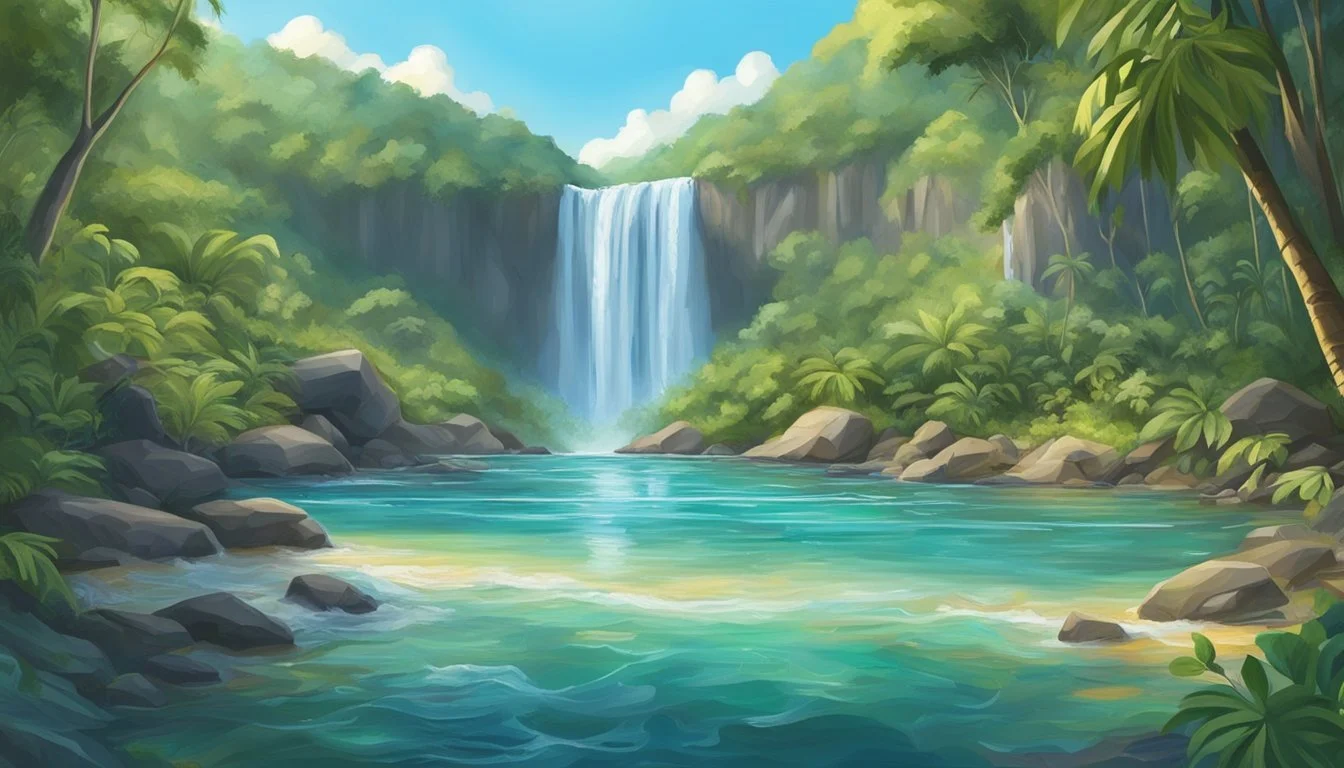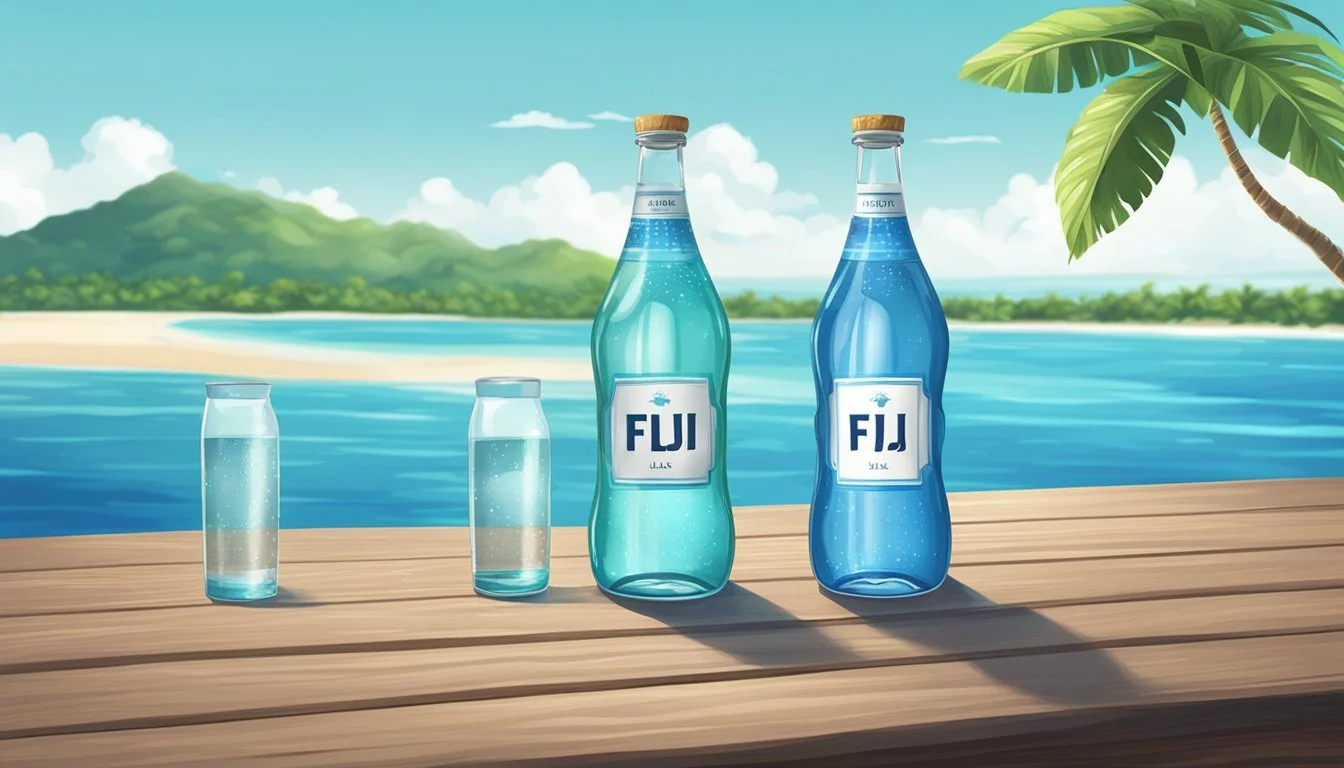Fiji vs. Open Water
A Straightforward Comparison of Bottled Water
Choosing the right bottled water can be a daunting task with so many options available. Among the myriad of choices, Fiji Water and Open Water stand out for their unique features and strong consumer demand. Fiji Water is known for its pristine source in the remote Yaqara Valley of Viti Levu, Fiji, while Open Water emphasizes sustainability with its aluminum packaging designed to reduce environmental impact.
When comparing Fiji Water to Open Water, a significant factor to consider is their packaging and environmental impact. Fiji Water is packaged in single-use plastic, which has raised concerns about environmental sustainability and potential health effects. On the other hand, Open Water uses recyclable aluminum bottles, offering a more eco-friendly alternative for environmentally conscious consumers.
Beyond the packaging, both brands offer distinct experiences in terms of taste and mineral content. Fiji Water boasts a natural artesian aquifer source, providing naturally occurring electrolytes and a smooth taste. Open Water, while also refreshing, focuses on offering a premium water product with reduced ecological footprint, appealing to those who prioritize environmental responsibility without compromising on quality.
Which bottled water brand you choose may depend on your stance on environmental responsibility and your preference for taste and mineral content.
Understanding Bottled Water
Bottled water comes in different types and follows specific quality and safety standards. Brand choices also influence consumer decisions based on various factors.
Types of Bottled Water
Bottled water is categorized into several types. Spring water is sourced from underground formations where water flows naturally to the surface. Mineral water contains natural minerals and elements, acquired from a geologically and physically protected underground water source. Artesian water originates from a confined aquifer that has been tapped by a well.
Tap water, often treated and purified, is another alternative, though not typically bottled. Popular bottled water brands include Fiji, Voss, Evian, Smartwater, and Dasani. Each variety offers distinct characteristics beneficial for different preferences and needs.
Water Quality and Safety Standards
Regulations ensure bottled water safety and quality. In the United States, the FDA oversees bottled water standards, paralleling the EPA standards for tap water. Bottled water must comply with comprehensive safety guidelines to ensure contaminants remain below harmful levels.
Testing for potential contaminants like bacteria, heavy metals, and chemicals is mandatory. Brands such as Aquafina, Nestle Pure Life, Poland Spring, and Pellegrino follow these stringent standards. Adherence guarantees health safety and product reliability.
Bottled Water Brands
Brand variety offers several choices to consumers. Fiji bottles artesian water, known for its silica content. Evian bottles mineral water sourced from the French Alps, providing natural electrolytes. Essentia offers ionized alkaline water, marketed for its potential health benefits.
Other brands include San Pellegrino, known for its sparkling mineral water, and Core Hydration, promoting balanced pH. Diverse sources and processing methods result in a wide spectrum of bottled water options, from basic purified water to mineral-rich selections, catering to various preferences.
Sourcing and Environmental Sustainability
Both Fiji and Open Water present unique approaches to sourcing their water and prioritizing environmental sustainability.
Natural Sources and Filtration Methods
Fiji Water is sourced from an artesian aquifer in Fiji and naturally filtered through volcanic rock. This process is believed to impart minerals such as silica and magnesium. The water is considered to be high-quality due to its natural filtering and isolated source.
Open Water is typically sourced from natural springs, which are then subjected to extensive filtration to ensure purity. Their filtration methods often include several stages to remove impurities while retaining beneficial minerals, making their water suitable for daily consumption and hydration.
Environmental Impact of Bottling
The environmental impact of bottled water is significant, especially with regard to single-use plastic. Fiji Water has faced criticism because their iconic rectangular bottles contribute to plastic waste. Despite their efforts to use 100% recycled plastic in the U.S., concerns about environmental sustainability persist due to the reliance on plastic and the energy used in transportation from Fiji.
Open Water, on the other hand, emphasizes their commitment to reducing environmental impact by using recyclable aluminum bottles. They aim to minimize carbon footprint by ensuring their packaging is easily recyclable and encouraging consumers to transition away from single-use plastics.
Innovations in Sustainable Packaging
Companies are adopting new strategies to improve sustainability. Fiji Water has transitioned to using 100% recycled plastic for some bottle sizes in the U.S. This move aims to reduce the reliance on virgin plastic and promote recycling among consumers.
Open Water takes sustainability a step further by using aluminum bottles and cartons, which are both highly recyclable and environmentally friendly. Their packaging choices are designed to appeal to eco-conscious consumers who are looking to reduce their environmental impact. The focus on renewable and recyclable materials positions Open Water as a leader in sustainable packaging within the bottled water industry.
Composition and Health Considerations
Fiji Water and Open Water differ in their mineral contents, purification processes, and potential contaminants. This section examines the specifics that influence their health impacts.
Analyzing Water Composition
Fiji Water is sourced from an aquifer in the Yaqara Valley of Viti Levu, Fiji. It boasts a unique mineral profile containing silica, calcium, and magnesium. Silica contributes to the water's smooth taste, while calcium and magnesium are vital for bone health and muscle function.
Open Water, packaged in aluminum bottles, usually undergoes reverse osmosis purification. This process removes impurities and adds a balanced mix of electrolytes for better taste. Its mineral content is typically lower than Fiji Water, prioritizing purity and refreshment over mineral richness.
Health Benefits of Hydration
Staying hydrated is crucial, affecting nearly every bodily function. Fiji Water provides natural electrolytes like calcium and magnesium which are essential for hydration balance and muscle performance.
Open Water, with its added electrolytes, ensures effective rehydration. While it might lack some natural minerals found in Fiji, its pristine composition suits those who prefer minimalistic hydration solutions without sacrificing cleanliness.
Both types of water aid in:
Temperature regulation
Joint lubrication
Cognitive function
Potential Contaminants
Fiji Water, though sourced from natural aquifers, has faced scrutiny over microplastics contamination, a common issue in plastic bottled water. The concern is that these microplastics could have long-term health implications.
Open Water, packaged in aluminum, reduces plastic pollution but isn't entirely free from potential contaminants. Issues can arise from the can lining, though less likely than plastic leaching.
Neither brand has shown significant presence of heavy metals, ensuring consumers are not exposed to harmful levels. Cleanliness and rigorous testing guard against common contaminants, maintaining high standards of purity for both brands.
Economic and Market Analysis of Bottled Water
The bottled water market is a dynamic and ever-growing sector characterized by diverse pricing strategies, brand differentiation, and evolving consumer preferences. Key aspects include pricing, brand reputation, and competitive dynamics.
Pricing and Brand Differentiation
Bottled water pricing varies significantly based on factors like brand reputation and packaging quality. Premium brands such as Fiji Water often command higher prices due to their marketing efforts and perceived quality. For example, Fiji Water typically costs around $2.50 per bottle, reflecting its premium market position.
Conversely, brands emphasizing eco-friendly practices, like Just Water, offer a more affordable alternative at approximately $1.99 per bottle. These pricing strategies are vital for capturing different segments of the market, from luxury consumers to environmentally conscious buyers.
Consumer Preferences and Trends
Consumer demand for bottled water continues to grow, driven by health concerns and convenience. Increasing awareness of water contamination issues has spurred the preference for trusted bottled water brands over tap water, which is viewed as less reliable.
The market also sees a shift towards sustainable packaging and ethical sourcing. Brands like Just Water gain favor by offering eco-friendly packaging and responsible sourcing. Health-focused consumers are particularly drawn to brands that promise purity and natural mineral content, further shaping market trends.
Competitive Landscape in the Water Industry
The competitive landscape is marked by both established brands and new entrants striving to capture market share. Major players like Fiji Water and Smartwater emphasize their unique sources and high-quality filtration processes to stand out.
In contrast, brands like Just Water differentiate themselves with sustainability and affordability. The global bottled water market was valued at approximately $303.95 billion in 2022 and is projected to grow, driven by innovations and strategic branding. As companies continue to innovate, the competition intensifies, leading to diverse options for consumers.
Direct Comparison: Fiji vs. Open Water
Fiji and Open Water differ in their taste profiles, packaging materials, and ethical values. Consumers looking for a premium experience or sustainable options will find unique attributes in each brand.
Taste Profile Analysis
Fiji Water is famous for its smooth and refreshing taste. This is largely due to its unique mineral profile, which includes silica, calcium, and magnesium. Many find the water to have a soft mouthfeel, attributing to its high pH level, typically around 7.7.
Open Water, on the other hand, emphasizes its crisp and clean taste. The water is purified through reverse osmosis, removing impurities. This process results in a neutral pH balance, aiming to leave no aftertaste. Some tasters note a slight metallic hint, possibly due to its stainless steel packaging.
Packaging and Convenience
Fiji Water uses iconic square plastic bottles, known for their aesthetic appeal. The plastic is BPA-free, ensuring safety. However, concerns about the environmental impact of plastic remain, despite the bottle's recyclability.
Open Water prioritizes eco-friendly practices by using aluminum bottles. These containers are refillable and fully recyclable, aligning with sustainability values. While not as lightweight as plastic, aluminum offers durability and a modern look. Both brands ensure convenient portability, though Open Water's packaging often appeals to environmentally conscious buyers.
Final Assessment
Fiji Water and Open Water offer unique advantages and disadvantages in areas like premium branding, sustainability, packaging, and taste.
Comparative Advantages and Disadvantages
Premium Brand and Taste: Fiji Water is renowned for its smooth taste and mineral content, contributing to its status as a premium brand. Open Water, while less known, offers a crisp taste. In blind taste tests, Fiji often ranks higher due to its unique silica content.
Environmental Impact and Sustainability: Fiji Water faces criticism for its use of single-use plastic packaging, which raises environmental concerns. Open Water uses aluminum bottles that are more easily recyclable and have a lower environmental impact. This makes Open Water a more sustainable choice.
Cost-Effectiveness and Brand Reputation: Fiji Water is priced higher, reflecting its premium brand reputation and purity. Open Water is often more affordable while still providing high-quality drinking water. Its cost-effectiveness appeals to eco-conscious consumers looking for sustainable options.
Each brand has its strengths and weaknesses, making the choice between Fiji Water and Open Water dependent on individual priorities like taste, environmental impact, and budget.
More About Fiji
Fiji vs Mountain Valley Spring Water: Which Bottled Water is Better?
Fiji vs Whole Foods Italian Still Mineral water: Which Bottled Water is Better?
More About Open Water
Aqua Carpatica vs Open Water: Which Bottled Water is Better?
Cascade Mountain vs Open Water: Which Bottled Water is Better?
Core Hydration vs Open Water: Which Bottled Water is Better?
Crystal Geyser vs Open Water: Which Bottled Water is Better?
Hawaii Volcanic vs Open Water: Which Bottled Water is Better?
Hawaiian Springs vs Open Water: Which Bottled Water is Better?
Icelandic Glacial vs Open Water: Which Bottled Water is Better?
Mountain Valley Spring Water vs Open Water: Which Bottled Water is Better?
Nestle Pure Life vs Open Water: Which Bottled Water is Better?
Open Water vs Kirkland Signature: Which Bottled Water is Better?
Open Water vs Whole Foods 365: Which Bottled Water is Better?
Richard's Rainwater vs Open Water: Which Bottled Water is Better?
San Pellegrino vs Open Water: Which Bottled Water is Better?
Solan de Cabras vs Open Water: Which Bottled Water is Better?
Talking Rain AQA vs Open Water: Which Bottled Water is Better?
Whole Foods Italian Still Mineral water vs Open Water: Which Bottled Water is Better?






